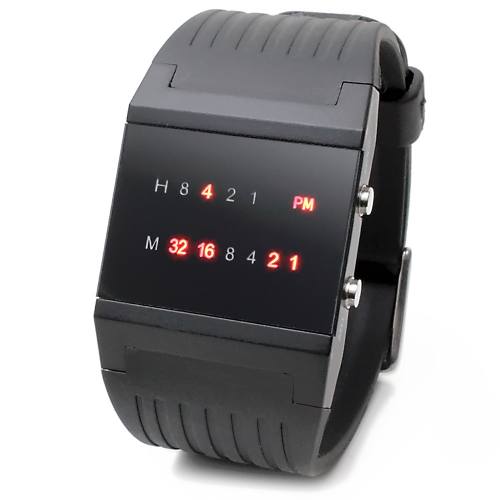Algorithm
Problem Name: 401. Binary Watch
A binary watch has 4 LEDs on the top to represent the hours (0-11), and 6 LEDs on the bottom to represent the minutes (0-59). Each LED represents a zero or one, with the least significant bit on the right.
- For example, the below binary watch reads
"4:51".

Given an integer turnedOn which represents the number of LEDs that are currently on (ignoring the PM), return all possible times the watch could represent. You may return the answer in any order.
The hour must not contain a leading zero.
- For example,
"01:00"is not valid. It should be"1:00".
The minute must be consist of two digits and may contain a leading zero.
- For example,
"10:2"is not valid. It should be"10:02".
Example 1:
Input: turnedOn = 1 Output: ["0:01","0:02","0:04","0:08","0:16","0:32","1:00","2:00","4:00","8:00"]
Example 2:
Input: turnedOn = 9 Output: []
Constraints:
0 <= turnedOn <= 10
Code Examples
#1 Code Example with C Programming
Code -
C Programming
#define MAX_HOUR 12 // this should be 13 so it includes 12:xx pm.
#define MAX_MIN 60
char** readBinaryWatch(int num, int* returnSize) {
char **pp, *p;
int sz = MAX_HOUR * MAX_MIN;
int hh[13]; // number of digits in hours
int mm[60]; // number of digits in minutes
int i, j, k, x;
i = 0;
while (i < MAX_HOUR) {
hh[i] = 0;
k = i;
while (k != 0) {
while (!(k & 0x1)) k = k >> 1;
k = k >> 1;
hh[i] ++;
}
i ++;
}
i = 0;
while (i < MAX_MIN) {
mm[i] = 0;
k = i;
while (k != 0) {
while (!(k & 0x1)) k = k >> 1;
k = k >> 1;
mm[i] ++;
}
i ++;
}
*returnSize = 0;
pp = malloc(sz * sizeof(char *));
p = malloc(sz * 6 * sizeof(char));
if (!pp || !p) return NULL;
k = 0;
i = 0;
while (i < MAX_HOUR) {
j = 0;
while (j < MAX_MIN) {
if (hh[i] + mm[j] == num) {
pp[k ++] = p;
sprintf(p, "%d:%02d", i, j);
p += 6;
}
j ++;
}
i ++;
}
*returnSize = k;
return pp;
}
Input
Output
#2 Code Example with Java Programming
Code -
Java Programming
class Solution {
public List readBinaryWatch(int turnedOn) {
return IntStream.range(0, 12)
.boxed()
.flatMap(
h -> IntStream.range(0, 60)
.boxed()
.filter(s -> Integer.bitCount(h) + Integer.bitCount(s) == turnedOn)
.map(m -> String.format("%d:%02d", h, m))
)
.collect(Collectors.toList());
}
}
Input
Output
#3 Code Example with Javascript Programming
Code -
Javascript Programming
const readBinaryWatch = function(num) {
const output = []
for (let h = 0; h < 12; h++) {
for (let m = 0; m < 60; m++) {
const ones = Number(h * 64 + m)
.toString(2)
.split('')
.filter(d => d === '1').length
if (ones === num) output.push(m < 10 ? `${h}:0${m}` : `${h}:${m}`)
}
}
return output
}
Input
Output
#4 Code Example with Python Programming
Code -
Python Programming
class Solution:
def readBinaryWatch(self, num):
"""
:type num: int
:rtype: List[str]
"""
return ['%d:%02d' % (h, m)
for h in range(12) for m in range(60)
if (bin(h) + bin(m)).count('1') == num]
Input
Output
#5 Code Example with C# Programming
Code -
C# Programming
using System.Collections.Generic;
namespace LeetCode
{
public class _0401_BinaryWatch
{
public IList < string> ReadBinaryWatch(int num)
{
var results = new List();
for (int i = 0; i < 720; i++)
{
int hour = i / 60;
int minute = i % 60;
if (BitCount(hour) + BitCount(minute) == num)
results.Add($"{hour}:{minute:00}");
}
return results;
}
private static int BitCount(int num)
{
var result = 0;
while (num > 0)
{
result++;
num &= num - 1;
}
return result;
}
}
}
Input
Output
